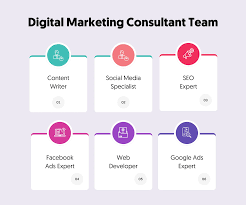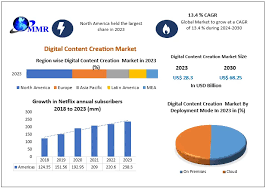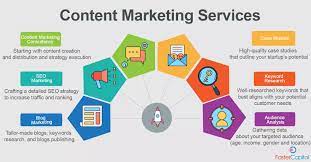Content Marketing Solutions: Unlocking the Power of Engaging Content
In today’s digital age, content is king. With the ever-increasing competition for online visibility and customer attention, businesses need to find innovative ways to stand out from the crowd. This is where content marketing solutions come into play.
Content marketing is a strategic approach that focuses on creating and distributing valuable, relevant, and consistent content to attract and retain a clearly defined audience. It goes beyond traditional advertising by providing informative, entertaining, or educational content that establishes trust and builds a connection with potential customers.
So, what are content marketing solutions? They are comprehensive strategies designed to help businesses harness the power of engaging content to achieve their marketing goals. These solutions encompass various elements such as content creation, distribution, promotion, and measurement.
One key aspect of content marketing solutions is understanding your target audience. By conducting thorough research and analysis, businesses can identify their target market’s needs, preferences, pain points, and interests. Armed with this knowledge, they can create tailored content that resonates with their audience and addresses their specific challenges.
Another vital component of content marketing solutions is the creation of high-quality content. This involves developing engaging articles, blog posts, videos, infographics, social media posts, podcasts, or any other format that aligns with your brand’s voice and values. The goal is to provide valuable information that educates or entertains your audience while subtly showcasing your products or services.
Once the content is created, distribution becomes crucial. Content marketing solutions employ various channels such as websites, blogs, social media platforms (Facebook, Twitter, LinkedIn), email newsletters, guest posting on relevant websites or industry publications to reach a wider audience. By strategically selecting the right platforms and optimizing distribution techniques like SEO (Search Engine Optimization) and social media advertising campaigns targeting specific demographics or interests can significantly boost visibility.
Promotion is another key aspect of effective content marketing solutions. Simply creating great content is not enough; it needs to be actively promoted to ensure maximum exposure. This can involve leveraging social media, influencer partnerships, email marketing, or paid advertising to amplify the reach and impact of your content.
Finally, measuring the success of your content marketing efforts is crucial. By tracking key metrics such as website traffic, engagement rates, conversion rates, and customer feedback, businesses can gauge the effectiveness of their content marketing strategies. This data-driven approach allows for continuous optimization and refinement of content marketing solutions to ensure the best possible results.
In conclusion, content marketing solutions offer businesses a powerful tool to connect with their target audience in a meaningful way. By providing valuable and engaging content that resonates with customers’ needs and interests, businesses can build trust, establish thought leadership, increase brand awareness, drive website traffic, generate leads, and ultimately boost sales.
If you are looking to unlock the power of engaging content and leverage it as a strategic asset for your business growth, consider investing in content marketing solutions. With the right strategy in place and the support of experienced professionals in this field, you can seize new opportunities and achieve remarkable results in today’s competitive digital landscape.
Frequently Asked Questions about Content Marketing Solutions: A Comprehensive Guide in English (UK)
- What are the 4 pillars of content marketing?
- What problems does content marketing solve?
- What are examples of content marketing?
- What are the 4 main categories of content marketing?
- What is content marketing solutions?
- What are the 7 steps of content marketing?
What are the 4 pillars of content marketing?
The four pillars of content marketing are:
- Strategy: A strong content marketing strategy is the foundation of any successful campaign. It involves defining clear goals, identifying target audiences, conducting research on their needs and preferences, and developing a plan to create and distribute relevant and valuable content. A well-defined strategy ensures that your content aligns with your business objectives and resonates with your audience.
- Creation: The creation of high-quality content is essential for engaging your audience and establishing your brand as a trusted authority. This pillar involves generating compelling ideas, crafting well-written articles, blog posts, videos, infographics, or any other format that suits your target audience’s preferences. The content should be informative, entertaining, or educational while aligning with your brand’s values and voice.
- Distribution: Creating great content is only half the battle; it also needs to reach the right people. The distribution pillar focuses on selecting appropriate channels to share your content effectively. This can include leveraging social media platforms, email newsletters, guest posting on relevant websites or industry publications, or even paid advertising to maximize visibility and attract a wider audience.
- Measurement: Measuring the success of your content marketing efforts is crucial for continuous improvement and optimization. This pillar involves tracking key metrics such as website traffic, engagement rates (likes, shares), conversion rates (leads generated or sales made), and customer feedback. By analyzing these metrics regularly, you can gain insights into what works best for your audience and make data-driven decisions to enhance future campaigns.
By focusing on these four pillars – strategy, creation, distribution, and measurement – businesses can develop effective content marketing campaigns that engage their target audience, drive brand awareness, generate leads, and ultimately achieve their marketing goals.
What problems does content marketing solve?
Content marketing is a powerful solution that addresses several challenges faced by businesses in today’s digital landscape. Here are some key problems that content marketing can help solve:
- Lack of visibility: In a crowded online marketplace, it can be challenging for businesses to stand out and gain visibility. Content marketing allows businesses to create valuable and engaging content that attracts their target audience, increasing brand visibility and awareness.
- Low website traffic: Without consistent traffic to their websites, businesses struggle to generate leads and conversions. Content marketing helps drive organic traffic by optimizing content for search engines, attracting visitors who are actively searching for relevant information or solutions.
- Limited customer engagement: Engaging customers and building relationships is crucial for long-term success. Content marketing provides opportunities to interact with customers through comments, social media shares, and email newsletters, fostering engagement and loyalty.
- Lack of thought leadership: Establishing thought leadership within an industry positions a business as an authority and builds trust with potential customers. Content marketing enables businesses to share informative and insightful content that showcases their expertise, helping establish credibility and thought leadership status.
- Ineffectiveness of traditional advertising: Traditional advertising methods often interrupt consumers’ experiences without providing value or relevance. Content marketing takes a more customer-centric approach by delivering valuable content that educates or entertains the audience while subtly promoting products or services.
- Difficulty in generating leads: Content marketing is an effective lead generation tool as it allows businesses to create content assets such as ebooks, whitepapers, webinars, or case studies that require visitors to provide their contact information in exchange for valuable resources.
- Negative brand perception or reputation management: When faced with negative reviews or public relations challenges, content marketing can help manage brand perception by creating positive narratives through storytelling and highlighting the company’s values, achievements, and positive customer experiences.
- Lack of customer trust: Building trust is essential for converting prospects into customers. By consistently delivering high-quality, informative, and valuable content, businesses can establish trust with their audience, positioning themselves as reliable sources of information and solutions.
- Difficulty in adapting to evolving consumer preferences: Consumer preferences and behaviors are constantly changing. Content marketing allows businesses to adapt their strategies by creating content that aligns with the evolving needs and interests of their target audience.
- Difficulty in measuring marketing ROI: Content marketing provides measurable results through analytics tools, allowing businesses to track key metrics such as website traffic, engagement rates, lead generation, and conversions. This data-driven approach enables businesses to evaluate the effectiveness of their content marketing efforts and make informed decisions for future strategies.
By addressing these challenges, content marketing provides businesses with a comprehensive solution that helps them connect with their target audience, build brand awareness and trust, generate leads, and ultimately drive business growth in the digital era.
What are examples of content marketing?
Content marketing encompasses a wide range of formats and tactics. Here are some examples of content marketing that businesses commonly use:
- Blog Posts: Creating informative and engaging blog posts on topics relevant to your industry or target audience can establish your expertise, attract organic traffic to your website, and generate leads.
- Social Media Content: Sharing valuable and engaging content on platforms like Facebook, Twitter, Instagram, LinkedIn, or YouTube helps build brand awareness, engage with your audience, and drive traffic to your website.
- Infographics: Visual representations of data or information can be highly shareable and easily digestible. Infographics help simplify complex concepts or statistics while promoting brand recognition when shared across various platforms.
- Videos: Creating videos that provide educational or entertaining content can be a powerful way to engage with your audience. Video content can include product demonstrations, tutorials, testimonials, or even storytelling to convey your brand’s message effectively.
- eBooks/Guides/Whitepapers: Offering in-depth resources in the form of eBooks, guides, or whitepapers positions your brand as a thought leader in your industry. These downloadable assets provide valuable information to prospects while capturing their contact information for lead generation purposes.
- Podcasts/Audio Content: Podcasts have gained popularity as a medium for sharing valuable insights and conversations with industry experts. They allow businesses to connect with their audience through audio content that can be consumed on-the-go.
- Case Studies/Testimonials: Showcasing success stories through case studies or testimonials helps build credibility and trust among potential customers by demonstrating how your products or services have positively impacted others in similar situations.
- Webinars/Live Streams: Hosting live webinars or streaming events allows businesses to interact directly with their audience in real-time. This format provides an opportunity to educate viewers on specific topics while addressing their questions and concerns.
- Email Newsletters: Sending regular newsletters with curated content, updates about your business, and exclusive offers can help nurture leads, retain customers, and drive traffic to your website.
- User-Generated Content: Encouraging your audience to create and share content related to your brand or products can be a powerful way to generate engagement and build a sense of community. This can include contests, hashtags, or featuring customer stories on your website or social media channels.
These are just a few examples of content marketing tactics that businesses employ. The key is to create valuable, relevant, and engaging content that resonates with your target audience and aligns with your overall marketing goals.
What are the 4 main categories of content marketing?
The four main categories of content marketing are:
- Educational Content: This category focuses on providing valuable information, insights, and knowledge to educate the target audience. It can include articles, blog posts, tutorials, guides, whitepapers, e-books, webinars, or instructional videos. The aim is to position your brand as a trusted source of expertise and build credibility by offering helpful content that addresses the audience’s questions or challenges.
- Entertaining Content: This category aims to captivate and entertain the audience while subtly promoting the brand. It includes content such as humorous videos, engaging social media posts, quizzes, contests, interactive experiences, or storytelling campaigns. The goal is to create a positive association with your brand by delivering enjoyable and shareable content that resonates with your target audience’s interests and emotions.
- Inspirational Content: This category focuses on evoking emotions and inspiring the audience by sharing stories, case studies, success stories, or testimonials that showcase how your products or services have made a positive impact on people’s lives or businesses. Inspirational content aims to create an emotional connection with the audience and motivate them to take action or believe in your brand’s mission.
- Promotional Content: This category involves explicitly promoting your products or services while still providing value to the audience. It includes content such as product demonstrations, customer reviews and testimonials, product comparisons or buying guides that help consumers make informed purchasing decisions. The goal is to showcase your offerings in a compelling way without being overly sales-oriented.
These four categories of content marketing can be used individually or combined strategically based on your business objectives and target audience preferences. A well-rounded content marketing strategy often incorporates elements from each category to provide a diverse range of content that engages and appeals to different segments of the audience throughout their customer journey.
What is content marketing solutions?
Content marketing solutions refer to comprehensive strategies and services designed to help businesses effectively plan, create, distribute, promote, and measure content for their marketing efforts. It involves leveraging engaging and valuable content to attract and retain a clearly defined target audience.
Content marketing solutions encompass various elements, including:
- Strategy: Developing a well-defined content marketing strategy that aligns with the business goals, target audience, and brand voice. This involves identifying the target audience’s needs, preferences, and pain points to create content that resonates with them.
- Content Creation: Producing high-quality and relevant content in various formats such as articles, blog posts, videos, infographics, social media posts, podcasts, or e-books. The content should provide value to the audience while subtly promoting the brand’s products or services.
- Distribution: Determining the most effective channels for distributing the content to reach a wider audience. This can include websites, blogs, social media platforms (Facebook, Twitter, LinkedIn), email newsletters, guest posting on relevant websites or industry publications.
- Promotion: Actively promoting the created content through various means such as social media sharing, influencer partnerships, email marketing campaigns targeting specific demographics or interests. The goal is to amplify the reach and impact of the content.
- Measurement and Analysis: Tracking key metrics like website traffic, engagement rates (likes/shares/comments), conversion rates (leads/sales), customer feedback to evaluate the effectiveness of content marketing efforts. This data-driven approach allows for continuous optimization and refinement of strategies.
Content marketing solutions aim to build trust with customers by providing valuable information that educates or entertains them while establishing thought leadership in the industry. By consistently delivering engaging content that addresses their audience’s needs throughout their buyer’s journey, businesses can increase brand awareness, drive website traffic, generate leads and ultimately boost conversions.
Implementing effective content marketing solutions often requires expertise in areas such as copywriting, SEO, social media management, analytics, and content promotion. Many businesses choose to work with agencies or professionals specializing in content marketing to ensure the best possible results.
In summary, content marketing solutions provide businesses with a strategic approach to leverage engaging and valuable content for their marketing goals. By understanding their target audience, creating compelling content, distributing it effectively, promoting it strategically, and measuring its impact, businesses can achieve significant growth and success in today’s competitive digital landscape.
What are the 7 steps of content marketing?
Content marketing is a strategic approach that involves planning, creating, distributing, and measuring content to attract and engage a target audience. While the specific implementation may vary depending on the business and industry, the following seven steps provide a general framework for effective content marketing:
- Set Clear Goals: Begin by defining your content marketing objectives. Are you aiming to increase brand awareness, generate leads, drive website traffic, or establish thought leadership? Setting clear goals will guide your content creation and distribution strategies.
- Understand Your Audience: Conduct thorough research to gain insights into your target audience’s demographics, interests, pain points, and preferences. This knowledge will help you create relevant and engaging content that resonates with your audience.
- Develop a Content Strategy: Based on your goals and audience insights, develop a comprehensive content strategy. This includes determining the types of content you will create (blog posts, videos, infographics), frequency of publication, tone of voice, and key messages.
- Create Compelling Content: Once your strategy is in place, start creating high-quality content that aligns with your brand’s voice and values. Ensure that it provides value to your audience by being informative, entertaining or educational while subtly showcasing your products or services.
- Distribute Widely: Develop a distribution plan to reach your target audience effectively. Utilize various channels such as social media platforms (Facebook, Twitter), email newsletters, guest posting on relevant websites or industry publications to expand the reach of your content.
- Promote Actively: Don’t just rely on organic reach; actively promote your content through social media advertising campaigns or influencer partnerships to amplify its visibility and impact.
- Measure Results: Track key metrics such as website traffic, engagement rates (likes/shares/comments), conversion rates (leads/sales), and customer feedback to measure the success of your content marketing efforts. Analyze this data to optimize your strategy and refine your content approach.
By following these seven steps, businesses can develop a robust content marketing strategy that effectively engages their target audience, builds brand awareness, and drives meaningful results. Remember, content marketing is an ongoing process that requires continuous evaluation and refinement to stay relevant in the ever-changing digital landscape.








